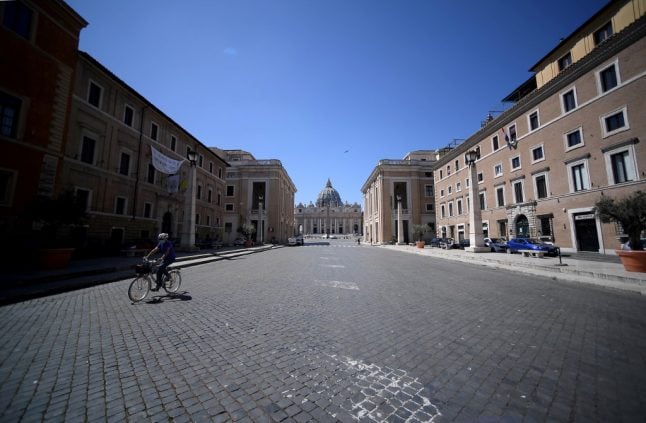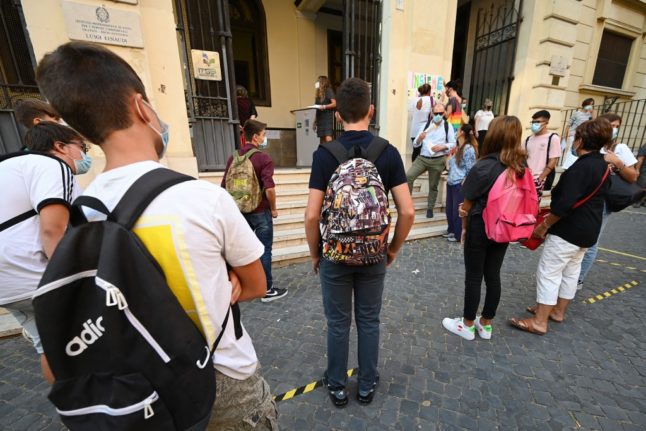The next phase of Italy's quarantine restrictions could be in place for “six to eight months”, some Italian health experts believe, while those eager to get the economy running again want measures loosened from May.
The Italian government continues to consult its panel of scientific experts on when and how to implement the so-called “phase two”, an intermediary period between the current strict lockdown and “phase three”, during which the country will begin its gradual return to normality.
Not much is known yet about official plans for phase two of quarantine. But the government is looking at making changes from the end of the current lockdown period on May 3rd.
 Photo: AFP
Photo: AFP
Italian Prime Minister Giuseppe Conte announced on Friday that some types of business and industry could reopen, including bookshops and children's clothing shops – which are deemed low risk as they rarely attract crowds of shoppers.
The national government allowed such businesses to reopen from Tuesday April 14th – although some of Italy's regional authorities refused to allow re-openings, and some businesses themselves chose to remain closed.
READ ALSO: Why the coronavirus quarantine rules aren't always the same around Italy
The government has been facing pressure from business groups and opposition politicians pushing for industrial activity to be allowed to restart.
A broader lifting of restrictions – with social distancing still in place – could be allowed as early as May 4th, they argue.
Meanwhile, medical experts argue that social distancing measures must stay in place for months yet – some say until the end of the year – amid fears that loosening measures too early could trigger a new wave of contagion, and a new lockdown.
So will “phase two” simply be about gradually reopening businesses, or will any other measures be lifted?
At the moment, not much is known about the government's plans.
Many people are keen for the government to allow outdoor exercise. Some regions, such as Veneto, have announced people may take limited amounts of exercise – no further than 200 metres from home, for no more than one hour per day.
But in most regions, this is not allowed. The rules on outdoor exercise across Italy are a little hazy, and change from region to region. But in most areas, no more than a short walk or jog around the block is allowed – and even then, some police officers may not deem this an acceptable reason to be outside.
When will schools reopen?
Schools are expected to remain closed until at least September, Italian media reports. This has not been officially confirmed by the government.
Medical experts reportedly view the idea of reopening schools during this school year as too risky, due to the fact it would mean some 12 million people – students, teachers, school staff, caterers, and others – moving around.
From September, ministers are considering a staggered or partial reopening of schools, or perhaps having all classes taught remotely.
Other restrictions are expected to stay in place for many months.
Long walks, restaurant visits, coffee on the piazza, and trips out of town aren't expected to be part of normal life in Italy again any time soon.
Is Italy facing a summer without travel?
A summer without trips to the beach is unthinkable for many Italians, and owners of private beach clubs and lidos are now scrambling to find ways to enforce social distancing on the beach in the hope that they might be able to reopen this season.
Alessandro Vespignani, an expert on epidemiology and the spread of disease, said this year Italians would be facing a summer “without travel”.
READ ALSO:
It's not clear yet how long the government expects the second phase to last. But Vespignani commented that “it is a process I see lasting for the next six to eight months”.
“The second phase will continue for a long time. We must not think that we can return to normality in July or August,” he said in a television interview on Wednesday.
Is testing the route out of lockdown for Italy?
The government has said repeatedly that phase two would involve “coexistence with the virus” and is likely to rely on testing to get people back to work.
“In phase two, we would like to extend the testing across the country to find those who are infected as early as possible – including those without symptoms,” Italy's ISS public health institute director Silvio Brusaferro said.

Photo: AFP
However, some doctors at the centre of the outbreak in Italy's Lombardy region on Wednesday cast doubt on the idea of mass testing, saying it was unrealistic, partly because of the shortage of swab tests.
Milan's Polytechnic Institute professor Davide Manca said it would take five years to conduct swab tests on everyone in the region at the current rate, adding that “you need people tested every 15 days for it to have any meaning.”
Daily new infections would need to slow to less than one percent before phase two could be brought in, experts have said.
The rate stood at 1.9 percent on Tuesday April 14th.
Italy's evidence-based medicine group Gimbe estimates that Italy won't see new cases at zero until at least June.
READ ALSO:
- Five reasons why the coronavirus hit Italy so hard
- How lockdowns and restrictions across different European countries may have saved lives
While business groups stress that continuing the lockdown past May would carry “heavy risks” for the economy, Italian Prime Minister Giuseppe Conte remains cautious.
He cites the scientific community when he insists that the lifting of the lockdown cannot be rushed because it could spark a new epidemic in another part of the country.
Officials have serious concerns about the prospect of a major outbreak in Italy's poorer south, where hospitals would not be able to cope.
Italian Health Minister Roberto Speranza has repeatedly warned that, although numbers of fresh cases are slowing, there's a very long way to go.
“We mustn't think we've won. The situation is and remains serious, it cannot be underestimated,” he said on Tuesday.
The World Health Organization's Italian government adviser Walter Ricciardi told Italy's La Stampa newspaper that social distancing measures might have to be enforced “until the end of the year.”
We will continue to bring you updates on the Italian government's plans for phase two as they are announced.
See all of The Local's reporting on the coronavirus outbreak in Italy here.



 Please whitelist us to continue reading.
Please whitelist us to continue reading.
Member comments